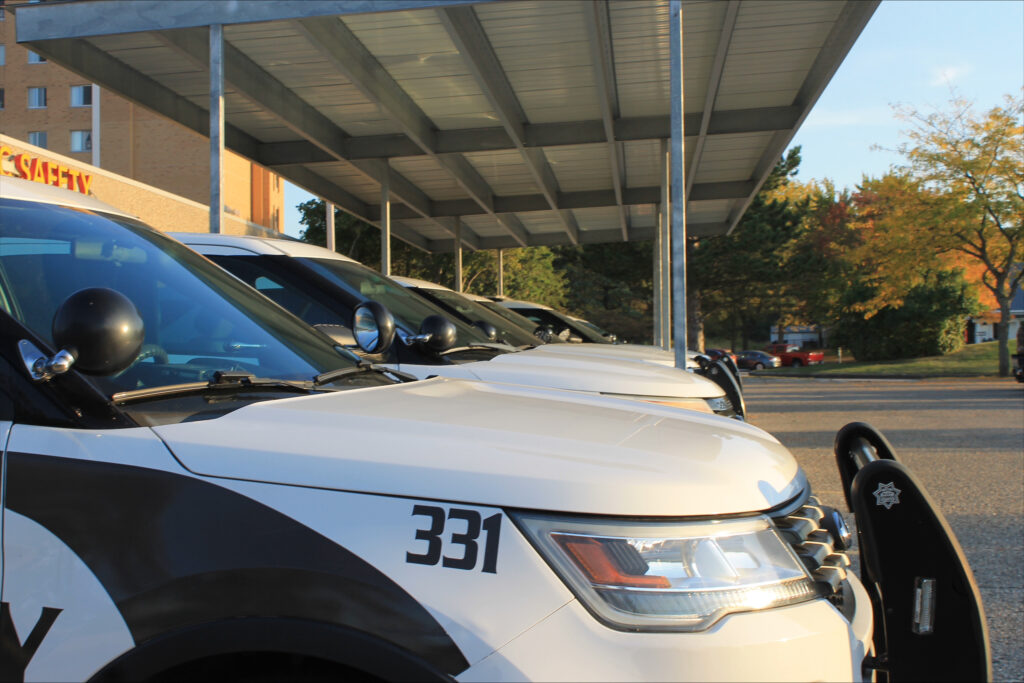Parking tickets can be a problem, what’s an even bigger problem is finding a place to park.
Even with over 7000 spaces on campus, which includes 1057 faculty staff spaces, 2500 commuter spaces, 2300 resident spaces and 222 Pango meter spaces, overflow parking is still a problem across campus.

Ferris State Department of Public Safety Captain Timothy Jacobs explained the importance of access to parking spaces for residents.
“When you have a specific lot where we put somebody in or with a place where it’s closest to their resident hall, or they’re like for a commuter near their building when the space is taken up by somebody else it limits their access to their parking spot,” Jacobs said. “It’s a limited source that we have so there’s maintenance for the lots, like snow plowing, painting of the lots, and so our goal is parking compliance. So, we don’t have to issue the enforcement part of the people that aren’t being compliant to benefit the people that actually paid for their parking spot.”
Jacobs then detailed how the Board of Trustees sets parking fines. The money received from students after paying off their tickets is then dispersed throughout the university from the general fund.
However, the money is not the problem, but rather the students who park in the wrong spaces are at fault. According to Bulldog Service CTR Specialist, Carla Hatfield, students who order their parking pass late usually end up in the overflow lots.
“If someone is in an overflow lot, it’s because they waited to order a parking pass,” Hatfield said. “Those spaces sold out and when those spaces are full you find another lot. It’s not to be mean, There is only so much space, and once that’s gone, it’s gone. So there are plenty of parking spaces, but they are just not next to the door where people want them. So it’s not a parking issue as it is a walking issue. No one wants to walk.”
Hatfield explained there is a parking lot across South State Street that is rarely used because students would need to cross the street to get to STARR. As an alternative to crossing the street, students would resort to parking closer in spots reserved for commuters and faculty staff and risk getting a ticket rather than being late for their class.
“They just want to park and get to their class on time, I understand that,” Hatfield said. “But if you would have just planned ahead, parked across the street, and walked over if you would’ve left your house five minutes earlier and allowed for that parking, you wouldn’t get that $20 ticket.”
When registering for classes and living on campus, parking can be considered an important factor. Depending on how far away the student lives from their classes, parking could be easy and convenient or very difficult. Senior in Optometry, Morgan Eiseler, explains her experience receiving a parking ticket.
“It was during exam week and I wanted to park at the library, and the only spots that were available were the metered spot, and I got a ticket,” Eiseler said. “My ticket was $10 and like obviously it was fine, I just paid it, but it was really inconvenient that I pay however much to park and have a commuter parking pass, and then I can’t even park at the library.”
With overflow parking, commuting students like Eiseler have trouble with finding parking to suit their needs. Planning could save students plenty of time and money, whether they have to drive to class or not.
Ferris DPS Detective/Sergeant Nicholas Greenway talked about the total amount of tickets for 2024 so far.
“So the total tickets so far this year are 2721 tickets, and though those just encompass all various violations, and then the monetary amount to that is $33,215 that doesn’t mean that everybody has paid that, but that’s just what everyone has,” Greenway said.
This amount comes from various students as a result of them parking in the wrong spaces. All in an effort to be either closer to where their classes are, or as a result of last-minute decisions to be on time for classes.
